Ray Bradbury and The Prunes Of Tomorrow
I want one of those wrinkle computers.
Apparently this is the handy work of Stan Freberg. Is he doing the voiceover? [via Martin]
posted in Midcentury, Space Age, Television | 3 Comments
I want one of those wrinkle computers.
Apparently this is the handy work of Stan Freberg. Is he doing the voiceover? [via Martin]
posted in Midcentury, Space Age, Television | 3 Comments
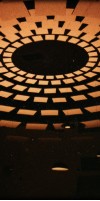
I was having dinner with a friend of mine two weeks ago, and she asked me what kind of music I listen to. In reality I listen to a lot of stuff — too diverse to lump into a single category — but for a few years now I’ve jokingly used the term Electro-Acoustic Soundscapes of the 70s. (My friend Martin coined that phrase after unsuccessfully searching through my iPod for 80s music). She had no clue what kind of music I was talking about and she pressed on, so I half-seriously elaborated with “You know, electronic boops and beeps, like outer-space stuff” even though I mostly don’t listen to that; it’s just a small sliver of my collection. And then the conversation moved on.
Little did I know that the 30 seconds I spent rattling off that term would pay me back so heartily. The next week she invited me out to a bar in San Francisco and warned me not to be late. After a quick drink, we walked down the street a few blocks until we came to an old looking wood-paneled building.
Opening the door revealed a museum-esque interior with a ticket booth, stationed by a very distinguished looking older woman. We purchased two tickets at $15 each, and we’re handed two programs labeled Audium: A Theatre In Sound-Sculptured Space. At this point my friend tells me that she remembered me talking about electronic beeps and whooshes from the previous week, found out about this place just by blind luck, and took me here sight-unseen because she thought it might “have some of that kind of beeping stuff in it”. Little did she know how right she was.
We stepped into a very serious looking room filled with sound-related sculptures as well as an array of speakers playing ambient noise: gentle water gurgling, hummingbirds zipping from one side of the room to the other. But this was just the lobby. Clearly this place was built in the 70s, and it looked like not much had changed. And after a bit of waiting around, the ambient noises got louder and the lights in the lobby grew dim, at the same time a spotlight appeared on a wood-paneled hexagonal door, where an gray-haired gentleman appeared.
He informed us and the other two dozen-or-so people in the lobby that we were about to enter the Audium, where we would be treated to a 139 speaker audio-performance-in-the-round dealing with “space and time travel”.
And it was going to be completely in the dark. For an hour.
And then we went inside. The theater itself looks as if the designers were going for 2001: A Space Odyssey but instead ended up with a set from Dr. Who. It was exactly what I was hoping for. The theater is arranged in a circle, with speakers all over the place … hanging from the ceiling, built into the walls, and under grates on the floor.
The real kicker, however, was when the lights dimmed out to complete blackness and the experience started. The soundtrack was straight out of the 1970s and didn’t sound like it had ever been updated (although I found out later that it had). But this was not music. Electronic beeps and boops were everywhere, “flying” through air, along with droning Wagnerian-style synth power chords, abruptly shifting to lo-fi organic recordings of nature, before popping back to beeps. Despite the 139 speakers in use, most of it sounded like it was just coming out of the four big speakers in each corner. It was largely rhythmless, and had no apparent story arc or narrative that was discernible from just listening. And the fidelity matched the decor. This was cliche 70s sci-fi art-school-project-on-drugs sound effects with a dash of the Space Mountain queue soundtrack thrown in. And it just kept going and going.
Half way through the performance there was a 5 minute (lighted) intermission and half the audience left, never to return. At this point I turned to my friend and asked her if she had it in her to listen to the second half, because she had no clue going into this what she was in for, isn’t into electronic music, and even I was kinda worn out by it. But she was gung-ho for soldiering through the second half … which ended up feeling like it was twice as long as the first half.
After the show was over, I was in shock. An hour in the dark listening to 1970s sound effects will do that to you. A zillion questions raced through my mind. Why have I never heard of this place? How did my friend find it? How has it not changed since the 70s? Why were they still getting crowds? I desperately wanted to talk to the gray haired guy, who turns out is the founder and sound designer, but I was worried he was going to chew my already-tired ear off with space and time travel theories.
The entire night was a completely surreal experience. If you’re into the mid century space-age movement at all, you need to go check the Audium out before it closes or gets remodeled. Even though I didn’t “get” what the soundtrack was about, and I thought it was a little long to sit through, I absolutely loved it and now I want to take all my friends. It’s definitely worth doing once for the sheer novelty effect even if you’re not into electronic music. But you better go soon … it really feels like it could close its doors for good any second.
Check out the Audium‘s website.
Audium 8 is performed every Friday and Saturday at 8:30pm. Price $15
Arrive by 8 pm since part of the fun is the lobby.
Please double-check before showing up, I really get the feeling this can change at any time.
1616 Bush St. (@ Franklin), San Francisco
Information: (415) 771-1616
*For the record, the 1970s electronic music I prefer is actual music, with percussion, melody, and harmony. The Audium had none of that. And yes, I did apologize to my friend for fibbing a little about my musical tastes.
posted in Midcentury, Music, Space Age, Tech | 1 Comment
Today, I would like to discuss one of the true classics of the Disney live action canon: Monkeys, Go Home! This 1967 film has it all… monkeys* — four of them, and they’re <dramatic echo>SPACE MONKEYS</dramatic echo> … Dean Jones … ’60s protests … Love, Frenchy Style … and as if that weren’t enough (no, stop! no, really!) … Maurice! Chevalier! And! The! Title! Ends! In! An! Exclamation! Point! Can you feel the hilarity?! So zany!!!
*phew* … I’ll take it down a notch or two now, before someone reaches through the screen to throttle me.
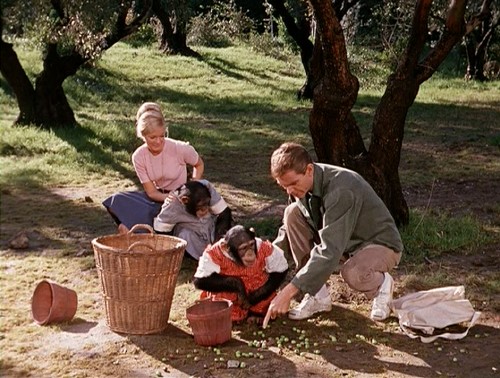
Alright now, where was I? Oh yes. Monkeys, Go Home. I mean, Monkeys, Go Home!. In this delightful, fun for the whole family maybe some of the family film, Dean Jones plays Henry Dussard, an American who has just inherited an olive farm he has never seen, in the south of France. Ooh la la! Being an American, he’s got some nutty ideas about how to turn this olive farm into a profitable venture — by hiring chimps instead of people to work the farm. Luckily, he previously was a chimp trainer for NASA, so he’s got a team of recently-retired space chimps at his disposal. So wacky!
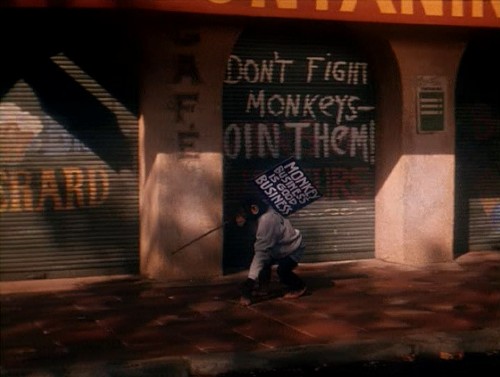
The little French town doesn’t like the idea of having to compete against a chimp-run farm, and they mount an underground resistance against Dussard. The chimps strike back by mounting a protest of their own, fighting for their right to work just as humans do. At the same time, a boozy French broad shows up claiming to be Dussard’s long-lost cousin (and she is truly fabulous, played by Yvonne Constant), staking claim to half of Dussard’s farm, and threatening Dussard’s budding relationship with a barely-legal French tartlet, played by Yvette Mimieux.
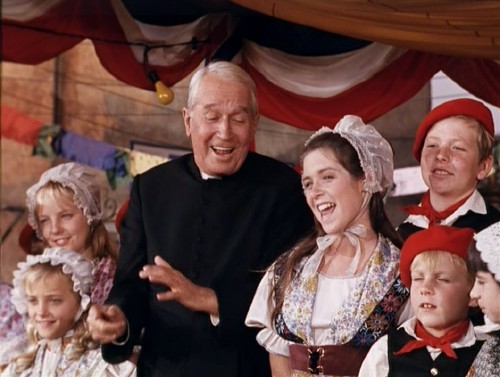
And just for good measure, Maurice Chevalier plays the town priest, who shows up now and then to impart some heavily-accented wisdom, and sing a song or two.
This is quite possibly the slapstickiest, monkeyest, wacknuttiest of all the Disney films. The hilarity, it ensues. This film… well, it’s sort of the Disney version of the Star Wars Holiday Special. I can’t help but wonder why they’ve released it on DVD, but I’m so glad they did. I kind of love it.
Oh! The music! The music is the best part, and I’m not kidding around here — I would sincerely buy Robert F. Brunner’s soundtrack/score. It’s great ’60s light-quirk-funk-pop stuff.
* Technically, chimps aren’t monkeys, but for the sake of simplicity, today we’ll say they are. It’s Topsy-Turvy day! Shrimp are fish! Tomatoes are vegetables! Mama’s Family was funny!
posted in Disney, Midcentury, Miscellaneous, Space Age | 8 Comments
Which one of these vans is cooler? I can’t decide.
[Via This Makes Me Laugh, I Love This World and Flickr]
I love midcentury futurism names. I dig on the Cinerama, and I can’t get enough juice from the Juice-o-matic. I named my game studio Monolux, I named my feedback system the Suggestomatic, and I named my game’s serial number generator the Tabulatron. Not only love those names, but I love the logos, styles, and aesthetics they conjure up. So naturally I became giddytronic when I saw Thrift Store Adventure’s photo collection of midcentury names and logos! There’s the Filmosonic, the Delineascope, the Selectron Semimatic, and WTF the Superheterodyne!!!! Check them out now!
posted in Design, Midcentury, Space Age | 1 Comment
Hang in there ’til the end. Whoa nelly! [via Vintage Ads]
posted in Midcentury, Space Age, Television | 4 Comments
The Monsanto House of the Future was part of Disneyland’s Tomorrowland from 1957 until 1967, and was a showcase of what plastics could do. The house was made of eight pre-fabricated plastic pieces; the building was so strong that when the time came for it to be demolished, the wrecking ball bounced right off.
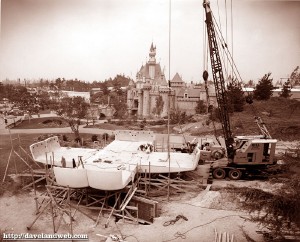
The Daveland blog has some great pictures from the Goody Clancy architecture firm of the house as it was being constructed. I love the above picture of the completed home — largely because it captures the pastoral feel of the landscaping, which is in such sharp contrast to the modern-as-modern-can-be home. I also love this picture to the left — this time, it’s the contrast of the traditional Sleeping Beauty’s castle in the background against the upstart little plastic building.
The Daveland blog has more pictures, be sure to check them out: Part 1 and Part 2 [via Stuff from the Park]
posted in Design, Disney, Midcentury, Space Age | 2 Comments
The wonderful Disney Blog 2719 Hyperion has a great piece on the Man In Space episode of Walt Disney’s Wonderful World Of Color, (the episode turned 52 just a few days ago). The episode is a peek into what the 1950s envisioned the future of space travel to be like. It features both live action lectures by Disney animator Ward Kimball and rocket scientist Wernher von Braun, as well as some animated futurist visuals that are not to be missed. 2719 Hyperion does a better job than I do at really coveying the impact of this midcentury science film:
Perhaps the most interesting footnote about Man in Space is the largely unnoticed impact it had on the development of the U.S. space program. President Eisenhower was so impressed with the program, he requested a print of the film to screen for high-ranking Pentagon officials, which was evidently instrumental in kick starting the country’s space initiatives.
Check out 2719 Hyperion’s post on Man In Space. If you’re nuts about it like I am, be sure to pick up the Tomorrowland DVD, which contains Man In Space along with a few other not-to-be-missed Space Age edutainment shorts from Disney’s timeless TV show.
posted in Animation, Disney, Midcentury, Science!, Space Age, Television | 1 Comment
“Protein Synthesis: an Epic on the Cellular Level” is a short film created in 1971 at Stanford University. The intro features Dr. Paul Berg, who would go on 9 years later to win the Nobel Prize for Chemistry. As much as I enjoy Dr. Berg’s intro, things really start to get running a bit past minute 3, when the hippies show up, demonstrating protein synthesis “using the dance idiom.” And balloons. And smoke. And a drum circle. It’s actually a very good demonstration of how protein synthesis works, and apparently it’s still shown in classrooms today. I first saw this film a bit over a decade ago, when I was working at ZymoGenetics.
posted in Midcentury, Science!, Space Age | 3 Comments
For my first post here on Junkyard Clubhouse I’d like to celebrate one of my favorite staples of the Space Age: The Nixie Tube. The Nixie Tube is the vacuum-tubesque ancestor of the digital readout. Once the mainstay for counting down Moon Launches and Doomsday Devices with, the Nixie Tube is now pretty much only favored by many a retro-minded hobbyist.
There’s some really cool commercial and homemade projects out there, including the Nixie Tube Wristwatch, some very cool clocks, and even some super old calculators. You can find a ton of cool Nixie-related auctions on eBay, and Wikipedia has a great entry for them too. Yay Nixie Tubes!
posted in Midcentury, Space Age | Comments Off